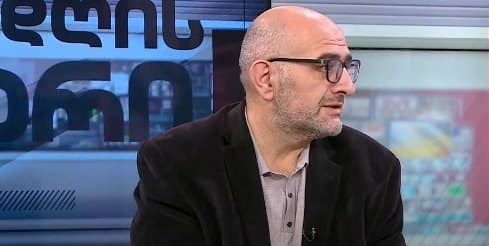Ukraine’s strikes on Russian airfields expose internal weaknesses, force strategic shift, Colonel Lasha Beridze

Planning and executing such a special operation with precision, secrecy, and no leaks is extremely difficult, Lasha Beridze said.
Author
Front News Georgia
Interview with Colonel Lasha Beridze by Front News on the recent Ukrainian special operations targeting Russian strategic airfields, possible Western involvement, implications for Russia’s military strategy, and the impact on peace negotiations.
Front News: Colonel Beridze, from both a military and political perspective, how would you assess Ukraine’s special operations on Russian strategic airfields?
Lasha Beridze: Planning and executing such a special operation with precision, secrecy, and no leaks is extremely difficult. Ukraine has clearly been preparing for this for a long time. As such, even now, no one can predict what further operations they might have planned.
This operation is a serious embarrassment for Russia and exposes its vulnerabilities internationally. Russia now appears weaker, and this will be closely watched not only in the West but also by China. Moscow will have to mobilize significant resources to protect other airfields, which means Russia must radically revise its airfield protection strategy.
It is also notable that the Ukrainians conducted this operation in a unique way - most likely with inside help. Ukraine has carried out several deep strikes inside Russia before. No one doubts that Russian internal opposition forces are assisting Ukraine in these special operations. In other words, the fortress has been broken from within.
All this was preceded by extensive intelligence work - a titanic effort by Ukraine’s special services. They clearly have real operational capabilities inside Russia now.
Front News: What damage was caused to Russian military infrastructure? To what extent did Ukraine achieve its main objectives?
Lasha Beridze: The damage is indeed significant. Reports suggest around 40 aircraft were damaged, including 8 strategic bombers destroyed. These bombers are difficult and costly to replace, so this is a huge loss.
While this will not entirely “break” Russia or immediately change the frontline, the losses will be significant militarily, politically, psychologically, and diplomatically.
Front News: Do you expect Russia’s strategic planning to change after these operations? How likely is Russia to retaliate, and where might Russia strike?
Lasha Beridze: We are already accustomed to harsh Ukrainian attacks. Russia’s response so far has been mostly predictable - large-scale missile and drone strikes targeting civilian infrastructure and the population.
It is hard to say exactly what Russia’s current resources are, but their retaliation will likely be similar. I do not exclude the possibility of renewed nuclear blackmail, although Putin has not made such threats publicly so far.
Front News: How likely is it that these attacks were carried out with Western technological or intelligence support? There are reports that President Trump was informed in advance and that US intelligence officials monitored the operation live. What is your view on Western involvement?
Lasha Beridze: I do not rule out anything, but in my opinion, this was a strictly Ukrainian operation. Coordinating such sensitive operations with foreign countries carries a high risk of leaks. If foreign political leaders had been fully informed, information would likely have leaked - especially in the US, where the political situation is unstable.
It is possible Ukraine was given general knowledge of upcoming operations by Western allies, but I doubt operational details were shared. Of course, the West supports Ukraine with intelligence in general terms, and Ukraine probably used this information.
Front News: How likely is Ukraine to use this operation as leverage in negotiations? We have seen the second round of talks in Istanbul. Will President Zelenskyy use this as a “trump card”? President Trump claimed Ukraine had no negotiating cards - has the situation changed?
Lasha Beridze: Trump was mistaken when he said Ukraine had no cards. Ukraine holds many strong cards. One major form of support Ukraine has received from Britain and Europe is preventing Ukraine from being portrayed as “oppressed.”
Moreover, Ukraine has proven capable of conducting large-scale special operations deep inside Russia. Their intelligence services have demonstrated that they can successfully challenge Russian special services.
Front News: How do you assess the negotiations in Istanbul? Are they a genuine chance for a ceasefire or just a tactical pause by Russia?
Lasha Beridze: Putin missed the chance for a ceasefire. An unconditional ceasefire would have suited Russia, but Putin’s ultimatum - surrender or continue fighting - led Ukraine to continue the war.
The Istanbul talks produced no real progress. The war continues, and neither Ukraine nor its Western allies intend to back down. The political course the US will ultimately take remains to be seen.
By Elza Paposhvili
Tags:
Lasha Beridze




